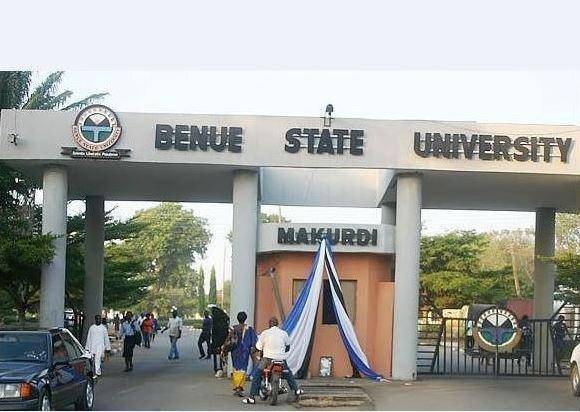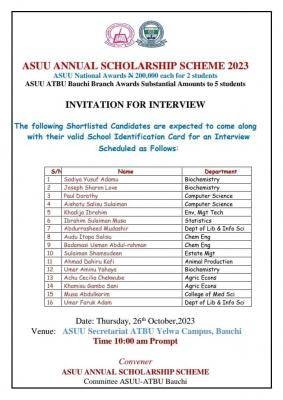
The Academic Staff Union of Nigerian Universities has been in the news a lot, courtesy of a strike action that has now entered its third month and shows no signs of ending any time soon.
There have been lots of heated arguments and debates, displays of emotion, and name-calling. Perhaps, it is really a complicated matter, as some would like us to believe; perhaps not. I’ll leave that to the “experts”. What I want to do in the first part of this article is share my general thoughts about the matter.
One. Insanity, they say, is doing the same thing and expecting different results. I left the University of Ibadan in 2004, almost a decade ago, and it’s somewhat puzzling to see that ASUU’s tactics has not changed from what it was when the body kept me at home for nine months in 2001/2002. Plus ça change, plus c’est la même chose. We all know the sort of government we have, so there are no points to be earned by ASUU for trying to scream louder than the rest of the country that we have a useless, dishonest government. We already know that; what next?
Two. It seems to me that ASUU, by prolonging the ongoing strike, is managing to accomplish only one thing: It is making the victims pay for the failings of the oppressors. ASUU’s qualms are with the Federal Government, but somehow, it’s the students – and their parents and guardians – who are at the receiving end of ASUU’s frustrations. Somehow, it doesn’t make sense to me. A strike action seems to me a rather lazy and unimaginative approach. I don’t see how ASUU expects those people that should be its key supporting constituency – students and parents/guardians – to take its side in this battle.
Three. ASUU seems to be trying to make us believe that the government is the sole problem, and that if we can just solve the funding and autonomy problems thrown at our universities by our admittedly irresponsible government, all will be well. ASUU seems keen on portraying itself as the helpless victim of an irresponsible government’s scheming. While that is to a large extent true, it’s not the entire story. The level of decay that we see in our universities could not have happened without the active participation of vice-chancellors and DVCs and university Senates and HODs, etc.
I believe that ASUU should be holding university administrators (and many of them are drawn from ASUU’s constituency) accountable to the same degree with which it is trying to hold the government accountable. For example, there’s no amount of funding that will tame sexual harassment – which is far more common in our universities than we like to admit – if our university administrators are themselves not keen to end it.
That many of our universities seem to be doing little or nothing to aggressively raise funds outside of “Abuja Allocation”, is a shame.
That many of our universities have been left behind in the internet age – disgraceful looking university websites, absence of on-campus Wi-Fi for staff and students, absence of automated transcript application systems, absence of computerised alumni lists – is less a funding problem than a vision and competence problem.
No amount of fresh funding will solve those kinds of issues. So, it seems to be that while fighting the government for more money and attention, ASUU also has a duty to fight itself and its members – the ones in administrative positions in the Ivory Towers – for greater demonstration of administrative competence and financial intelligence.
Without that, no amount in funding increases will make a difference.
Four. If ASUU’s intention is to fight for the salvation of the university system, it’s not doing a very good job of communicating this. ASUU seems to be doing a rather poor job of stating its case for the benefit of the general public. And in that failing, it is losing a lot of the potential public goodwill that could translate into heightened moral power. And it’s difficult to not assume that this strike action, like the innumerable ones before it, is yet another ill-considered, self-serving campaign, without any real regard for an overwhelming structural change in the way our universities are funded and run.
The second part of this piece is a revised version of an article I wrote in November 2010, titled, “The idea of the Nigerian university.”
It is my hope that amidst this storm of allegations and counter-allegations, and agreements and dis-agreements, we will all occasionally take the time off to pause and ponder on the bigger picture; the deeper questions: What’s a university for? What should the Nigerian university symbolise, and seek to achieve, in the 21st Century.
Here’s excerpts from the article:
Imagine wiping off the face of the United States, or Britain, all universities. Imagine the total breakdown of society that would follow. Now, imagine doing the same to Nigeria. Same effect?
For some time now, I have been thinking of the idea of the Nigerian university. What is it? What should it be?
Let’s focus on Nigeria’s oldest, and arguably most distinguished, university – Ibadan. Its early graduates speak of it with cloying nostalgia: Oladipo Akinkugbe, Emeritus Professor of Medicine, and a 1950s graduate (Ibadan was then still a college of the University of London), recalls an “elitist flavour”: “Black bow-ties at Hall Dinners, High Tables, The Grace in Latin and, for the more imaginative, port under the palm trees!”
In its heyday, it appears that much of what Ibadan, the King of Nigerian universities, had to offer, lay in the stifling realms of (colonial) elitism. Today, decades later, shorn of that admittedly unnecessary elitism, what is left?
On a recent trip (belated no doubt!) to collect my degree certificate, I had to spend some time ploughing through literally hundreds of tuition fees receipt booklets dating back to 1998, the year I was admitted to study Pharmacy. Having lost my 1st year receipt (Ibadan expects certificate-seeking graduates to produce hard-copy evidence of every tuition payment they made during their time there), I was expected to search for the university’s original copy. Computer records – what’s that?
Ibadan has a new Vice-Chancellor, Isaac Adewole, a Professor of Obstetrics and Gynaecology, who will take office in a month. Adewole is not at all to be envied. I don’t think that vice-chancellors in the 21st century should have to deal with the task of modernising students’ records systems and making sure that electricity and water are flowing so students can power their laptops and BlackBerry phones. But that is what he will have to spend a chunk of his time doing.
American science writer, Steven Johnson, writing recently in the Financial Times, argued that Silicon Valley was “shaped as much by the counterculture that thrived in the San Francisco Bay area as it was by the engineering prowess of Stanford University.”
“The engineering prowess of Stanford University.” Boiled down to the basics, those are the only university testimonials that (should) count. One wonders what a University of Ibadan would claim, were universities compelled to line up and ‘sell’ themselves in 10 words or less?
It does little good to recall the ‘good old days’ of Ibadan, when students were fed roasted chicken and wrote love letters in Latin. What we should be asking urgently is this: How has Ibadan made itself relevant in the 21st century; how has it adapted itself to a country in which philistines oversee the public treasury; how has it stayed faithful to the idea of a university serving as a collision-chamber for envelope-pushing ideas, as a centre of collaboration for creative people?
Today, sadly, our universities are more likely to make the news as bastions of religious fundamentalism (recall the apocalyptic saga in the Obafemi Awolowo University a few years ago, and the recent Christian-Muslim upheaval in Ibadan) than as ‘citadels of learning’. In his essay, “Of Prizes and Messiahs”, poet, dramatist and critic, Niyi Osundare, describes African universities as “citadels of marginal silence.”
An urgent task confronting Adewole is how to take Ibadan from the margins; how to free it from the ‘bubble-wrap’ that has not only suffocated ideas, but has also made the university irrelevant in the larger scheme of things; blissfully disconnected (like every other Nigerian university) from the outside world.
And I don’t see why a Fola Adeola, Lemi Ghariokwu, Sefi Atta, King Sunny Ade, Oby Ezekwesili, or Nasir El-Rufai should not be ‘hounded’ into a Honorary Professorship at Ibadan – where s/he will spend time interacting with and mentoring a new generation of leaders/creative people.
When you think of the fact that Ibadan, bad as things are with it, is still one of the ‘best’ around (there are universities in this country that would be far more useful to the society serving as Correctional Centres), you will have no choice but to take the time to observe a full minute of silence, for our hundred-plus Citadels of Nothing.

